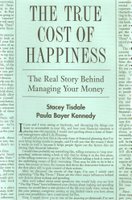
Reviewed: “The True Cost of Happiness,” by Stacey Tisdale and Paula Boyer Kennedy, Wiley, 2007, $24.95, 288 pages.
How your parents handled money influences the way you handle your finances, according to “The True Cost of Happiness,” a book co-authored by business journalist Stacey Tisdale and financial planner Paula Boyer Kennedy.
Readers are encouraged to take a look at the role family dynamics play in their financial behavior.“I’m talking about the ways in which the first lessons we learned about money as children affect our decision about making and spending it as adults,” writes Tisdale, who penned the first half of the book, which focuses on self-awareness.
In my family, my father managed the money. My mom took care of the house and three kids. The bills and the bank account were the man’s job. When my father died at age 58, losing a 13-year battle with cancer, my mother was thrust into a position of total financial responsibility — a role no one had prepared her for. When my mom was growing up, her father took care of the household finances. She learned at an early age that money was the man’s job. And that was the norm of the time, and it worked out OK for my mom. Until circumstances in her adult life necessitated a crash-course in paying bills.
Learned financial behaviors are what Tisdale and Boyer Kennedy call “money scripts.” Leaving room for you to write down your thoughts, they ask you to explore your own “money scripts” learned in childhood, and look at how they play a part in your financial attitudes as an adult.“Think about those money scripts that are limiting you. Imagine your life without those messages. How would your actions be different?” the authors write.
If your behavior isn’t leading you to your financial goals, then you need to take a new tack, they say. They walk you through ways to make those changes. One fun exercise, that I’m sure each of us has indulged in some variation, is:
•Imagine that you have all the money you will ever need. Decide what you would do with it, your life and your time.
•Next, change that picture. Now you only have 5 to 10 years to live. How will you change your life? What will you do with the time you have left?
•Lastly, imagine the changes you’ll wish you had made if you only have 24 hours to live.“The question is not what you would do with the time you have left, but what are your regrets?” the authors ask. That last scenario, they say, “cuts deepest of all. It becomes clear which issues in life are superficial and which are central. Sometimes this exercise delivers a … longing or wish that has never before surfaced.” It’s a thought-provoking way of getting to your big picture goals.
For instance, I have a desire to travel, but I feel like with my current monthly bills (mortgage!) I don’t have enough money to go anywhere. Per the authors’ advice, I can afford a trip to, say, Italy, if I make a budget and start setting aside a small sum every month.
Those who dislike the “getting in touch with your financial feelings” part of the book may be more comfortable with the second half of the book, which focuses on numbers. Basically, it tells you how to make a budget — something a lot of people simply don’t do. “We think having to literally face your values and your barriers each time you look at your finances will be an important factor in keeping your financial decisions aligned with your priorities,“ writes Boyer Kennedy, who handles the numbers-focused latter half of the book.
In other words, make a budget and stick to it and you may be able to save some money for a trip abroad … or retirement!
While the authors offer some very sound, practical advice, they also suggest that readers visit a financial planning professional to help you figure it all out.“The True Cost of Happiness” helps readers to determine why they spend/save as they do and what they could do better to meet certain goals.
Michelle Karas is The Mercury’s business editor.
1 comment:
Money completely stresses me out. I should really be better with money than I am, but just thinking about it makes me worry. But these suggestions look like they help you get over whatever crazy money phobia you might have.
A very interesting review.
Post a Comment